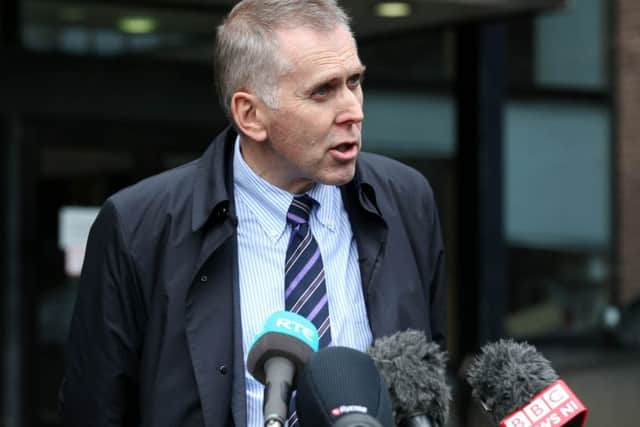DUP and SF asked man involved in RHI to find '˜independent' investigator
and live on Freeview channel 276
David Sterling, who is now the head of the civil service, made the revelation in a written statement to the RHI Inquiry which it published last night ahead of his final appearance before Sir Patrick Coghlin’s inquiry this morning.
The evidence raises questions about how serious the DUP and Sinn Fein were at that point about really getting to the truth of the RHI scandal, a process which has ultimately led to damaging revelations about both parties.
Advertisement
Hide AdAdvertisement
Hide AdAt the time when the RHI scandal became a crisis for Stormont, Mr Sterling was permanent secretary in the Department of Finance.


Recalling that time he said that the Audit Office report which first publicly exposed the RHI scandal in July 2016 “gave rise to relatively low media comment” and it was not until after the BBC Spotlight programme on December 6 that the issue became a crisis – and particularly “the subsequent focus by the BBC Nolan radio programme” which “gave rise to major concern within the Executive about the damage the fall-out from RHI was doing to the reputation of the Executive”.
However, despite the public outcry and the revelation that a whistle-blower had personally approached Arlene Foster, the minister who established the scheme, Mr Sterling said that there was still “meaningful and constructive cooperation between Spads after the Spotlight programme and broad agreement that the Executive would need to try to regain some control of events”.
He said: “During the week beginning December 12 2016 consideration was being given to conducting a short, focused investigation by someone with expertise and independence, but short of a full public inquiry.
Advertisement
Hide AdAdvertisement
Hide Ad“I was involved in a conference phone call with the head of the civil service (HOCS) on the morning of Thursday December 15 at which such an idea was being pursued. My recollection is that Hugh Widdis, [senior Sinn Fein aide] Aidan McAteer and [top DUP Spad] Timothy Johnston were with HOCS at the time.
“I was tasked with trying to find a suitable independent person ideally with expertise on the energy sector.”
Mr Sterling had been the top official in Mrs Foster’s department when RHI was set up and during its first few years, before moving to the finance department where he was again involved in closing RHI. For that reason, he is an important witness and when the public inquiry was later being established by his department Mr Sterling recused himself from that process.
Mr Sterling said that it was Jonathan Bell’s remarkable televised interview with Stephen Nolan, followed by an interview with Mrs Foster, which “changed the dynamic” and by the following day “it became clear ... that Sinn Fein were fundamentally reappraising their approach”.
Advertisement
Hide AdAdvertisement
Hide AdMr Sterling also spoke at some length about how the revelations of the inquiry have undermined public confidence in the civil service.
He said: “The extent of the failings uncovered by the RHI Inquiry so far has, quite understandably, given rise to questions about the competence and capacity of the NI Civil Service to develop and deliver complex policy.”
However, he said it would be “unjust to infer from the RHI scheme that all government policy-making, the administration of public funds and the delivery of public services in Northern Ireland is beset by the kinds of problems and issues that have arisen in the case of RHI”.
He said he believed there was “a strong case for a review” of how Spads operate before any return to devolution.